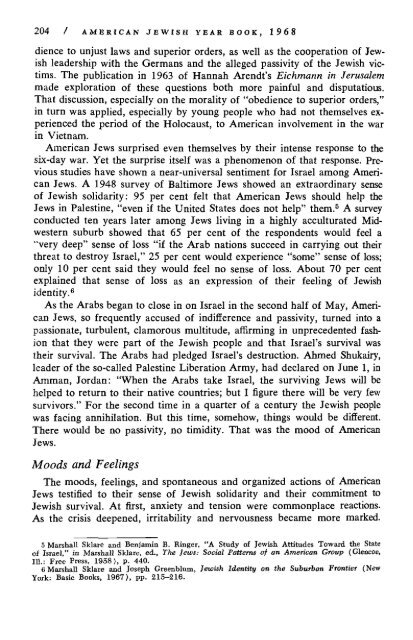1968_4_arabisraelwar
You also want an ePaper? Increase the reach of your titles
YUMPU automatically turns print PDFs into web optimized ePapers that Google loves.
204 / AMERICAN JEWISH YEAR BOOK, <strong>1968</strong><br />
dience to unjust laws and superior orders, as well as the cooperation of Jewish<br />
leadership with the Germans and the alleged passivity of the Jewish victims.<br />
The publication in 1963 of Hannah Arendt's Eichmann in Jerusalem<br />
made exploration of these questions both more painful and disputatious.<br />
That discussion, especially on the morality of "obedience to superior orders,"<br />
in turn was applied, especially by young people who had not themselves experienced<br />
the period of the Holocaust, to American involvement in the war<br />
in Vietnam.<br />
American Jews surprised even themselves by their intense response to the<br />
six-day war. Yet the surprise itself was a phenomenon of that response. Previous<br />
studies have shown a near-universal sentiment for Israel among American<br />
Jews. A 1948 survey of Baltimore Jews showed an extraordinary sense<br />
of Jewish solidarity: 95 per cent felt that American Jews should help the<br />
Jews in Palestine, "even if the United States does not help" them. 5 A survey<br />
conducted ten years later among Jews living in a highly acculturated Midwestern<br />
suburb showed that 65 per cent of the respondents would feel a<br />
"very deep" sense of loss "if the Arab nations succeed in carrying out their<br />
threat to destroy Israel," 25 per cent would experience "some" sense of loss;<br />
only 10 per cent said they would feel no sense of loss. About 70 per cent<br />
explained that sense of loss as an expression of their feeling of Jewish<br />
identity. 6<br />
As the Arabs began to close in on Israel in the second half of May, American<br />
Jews, so frequently accused of indifference and passivity, turned into a<br />
passionate, turbulent, clamorous multitude, affirming in unprecedented fashion<br />
that they were part of the Jewish people and that Israel's survival was<br />
their survival. The Arabs had pledged Israel's destruction. Ahmed Shukairy,<br />
leader of the so-called Palestine Liberation Army, had declared on June 1, in<br />
Amman, Jordan: "When the Arabs take Israel, the surviving Jews will be<br />
helped to return to their native countries; but I figure there will be very few<br />
survivors." For the second time in a quarter of a century the Jewish people<br />
was facing annihilation. But this time, somehow, things would be different.<br />
There would be no passivity, no timidity. That was the mood of American<br />
Jews.<br />
Moods and Feelings<br />
The moods, feelings, and spontaneous and organized actions of American<br />
Jews testified to their sense of Jewish solidarity and their commitment to<br />
Jewish survival. At first, anxiety and tension were commonplace reactions.<br />
As the crisis deepened, irritability and nervousness became more marked.<br />
5 Marshall Sklare and Benjamin B. Ringer, "A Study of Jewish Attitudes Toward the State<br />
of Israel," in Marshall Sklare, ed., The Jews: Social Patterns of an American Group (Glencoe,<br />
111.: Free Press, 1958), p. 440.<br />
6 Marshall Sklare and Joseph Greenblum, Jewish Identity on the Suburban Frontier (New<br />
York: Basic Books, 1967), pp. 215-216.


